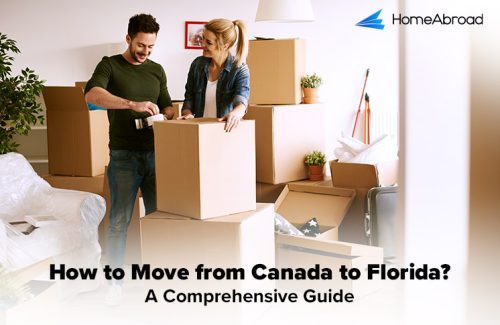Editorial Integrity
Moving to the US can feel overwhelming, filled with unknowns and uncertainties. HomeAbroad editorial team includes certified immigration experts/USCIS nerds who translate complex legalese into clear, actionable moving and visa guides. Rest assured, every article undergoes a reader-centric editorial process to ensure accuracy and reflect current regulations.
Florida, often called the “Sunshine State,” remains a top destination for Canadians looking to capitalize on its booming economy and unmatched quality of life. As of 2025, nearly 60,683 Canadians have chosen Florida as their home, taking advantage of its dynamic job market, no state income tax, and affordable cost of living. Cities like Sarasota, Naples, and Fort Lauderdale offer beautiful weather and vibrant, diverse communities that make settling in easy and rewarding.
Beyond the sunshine, the state boasts a thriving economy with strong tech, healthcare, real estate, and tourism growth. The absence of a state income tax and affordable housing make it an attractive destination, offering ample job opportunities for professionals and an excellent environment for families to grow and thrive.
This article will discuss how Canadians can move from Canada to Florida, how you may take your family along, the forms and documents required for the procedure, and the checklist of things you should consider before moving to the Sunshine City. So, let’s dive in.
Key Takeayays:
1. Canadians can stay in the US as visitors for up to six months without a visa, but relocating permanently or for long-term stays requires proper immigration status. Options include work visas (like the TN visa under USMCA), family sponsorship, or investment-based visas.
2. Canada and the US have a tax treaty that helps prevent double taxation, so you won’t be taxed twice on the same income.
3. Florida is tax-friendly (no state income tax), has a warm climate, and offers a relaxed lifestyle with beautiful beaches and vibrant communities. The state also has a large snowbird and expat population, so many services and communities cater to Canadians.
Table of Contents
How to Move to Florida from Canada?
Moving to Florida as a Canadian skilled worker is achievable through the Employment-Based (EB) Visa categories, such as EB-2 or EB-3. To qualify, you’ll need:
- A valid job offer from a US employer.
- Employer sponsorship for the visa.
- Relevant qualifications and professional experience that align with the job.
Based on my experience working with numerous Canadian clients, applicants with strong employment histories and precise documentation of their skill sets tend to navigate the process more smoothly. US immigration officials increasingly value proven work experience when assessing long-term employability and visa eligibility.
For Canadians who don’t fall under the EB category, there are several alternative visa options:
- TN Visa under USMCA – for professionals in approved occupations like engineers, scientists, and accountants.
- E Visa – for investors or traders.
- K Visa – for fiancés of US citizens.
- V Visa – for family members of US permanent residents.
Once your documentation is in place, you can begin your journey as a foreign worker in Florida. But what if you wish to bring your family along? Then, this is what you do.
How to Bring Your Family to Florida from Canada?
If you plan to relocate to Florida with your family, the process differs slightly from that for individual applicants. Family members (spouse and children) typically apply as dependents linked to your primary visa. For example, if you are moving on an employment-based immigrant visa, your spouse and children are considered derivative applicants.
The required documentation includes:
- Marriage Certificate: Proof of legal marriage.
- Birth Certificates: These are for each child to verify the familial relationship.
- Passports: Valid travel documents for every family member.
- Employment-Related Documents: Your employment verification and visa approval support your visa status.
Once all the required paperwork is in place, your family can apply for their dependent visas at the US Embassy or Consulate. After their visa interviews and the necessary background checks and verifications, they can make travel arrangements and join you in Florida if their visa applications are approved.
Immigration Forms Required by Canadian Citizens to Move to Florida
Canadian citizens can visit the US for short stays without a visa. Still, if you plan to relocate to Florida for work, family, or long-term living, you must go through a formal immigration process. Different forms apply depending on your situation, whether you’re applying from inside or outside the US, and whether your move is temporary or permanent.
Here’s a breakdown of the key immigration forms you may need:
1. eTA (Electronic Travel Authorization) – For Canada, not the US.
The eTA is not required to enter the US; it’s a Canadian requirement for citizens flying back to Canada. It’s not part of the US immigration process.
2. I-140 – Immigrant Petition for Alien Worker
A US employer files this form to sponsor you for a green card (permanent residency) based on employment. It’s the first step in the employment-based immigration process.
- Filed by: US employer
- Purpose: Employment-based green card sponsorship
3. I-485 – Application to Register Permanent Residence or Adjust Status
If you’re already in the US on a different visa and want to become a permanent resident, you’ll use this form to adjust your status to that of a green card holder.
- Filed by: The applicant (you)
- Purpose: Adjusting status from nonimmigrant to permanent resident
4. DS-260 – Immigrant Visa Application
If you’re applying for an immigrant visa (green card) from outside the US, including from Canada, you’ll complete this form online. It is used for consular processing, which consists of an interview at a US consulate or embassy.
- Filed by: The applicant (you)
- Purpose: Immigrant visa application processed abroad
5. DS-160 – Nonimmigrant Visa Application
This online form is required if you’re applying for a temporary (non-immigrant) visa. Canadians don’t need tourist visas, but you will need a DS-160 for visas like:
- TN visa – for professionals under USMCA
- E-2 visa – for investors
- K-1 visa – for fiancé(e)s of U.S. citizens
- Filed by: The applicant (you)
- Purpose: Temporary work, business, or family-based stay in the US.
Once your forms are approved and your visa is issued, your passport will be stamped upon entry. Your stay will depend on the visa type; some allow multiple years, while others require extensions or renewals. If you obtain a green card, you may become eligible for US citizenship after five years of permanent residency.
Types of Visas to Immigrate from Canada to Florida
Canadians who want to stay in Florida for an extended period or relocate permanently must go through the US immigration process. Different visa options are available depending on your reason for relocation, such as work, investment, family reunification, or marriage. Here’s a breakdown of the most common types of visas Canadians use to move to Florida:
1. E Visas – Treaty Trader & Treaty Investor
E-1: Treaty Trader Visa
For Canadian citizens engaging in substantial international trade between the US and Canada.
E-2: Treaty Investor Visa
This is for those who invest substantially in a US business and play a key role in its development or operation.
- You must be the principal investor or an essential employee.
- Investment must be active (not passive, like buying property).
- Valid for up to 5 years and renewable indefinitely.
This visa is ideal for entrepreneurs, business owners, and executives seeking to build and manage a company in Florida.
2. K Visas – Fiancé(e) and Family of US Citizens
K-1: Fiancé(e) Visa
For Canadians who are engaged to US citizens and intend to marry within 90 days of entering the US.
- Once married, you may apply for a green card.
- Requires proof of a genuine relationship and prior in-person meeting (with some exceptions).
K-2: Children of K-1 Applicants
- For unmarried minor children (under 21) of K-1 visa holders.
These visas allow families to begin living together in the US before completing permanent residency.
3. V Visa – Family of Lawful Permanent Residents
This visa was designed for the spouses and children of green card holders (Lawful Permanent Residents) waiting for immigrant visa processing.
- V-1: Spouse of an LPR
- V-2: Child of a V-1 or LPR
Due to long wait times and changes in immigration law, the V visa is rarely used today. Most family reunification now occurs through the I-130 petition process.
4. TN Visa – Professionals Under USMCA
The TN Visa is available to Canadians under the United States–Mexico–Canada Agreement (USMCA), formerly NAFTA.
- For professionals such as engineers, accountants, scientists, teachers, and nurses.
- Requires a prearranged US job offer in a qualifying occupation.
- Valid up to 3 years and renewable indefinitely, as long as you maintain nonimmigrant intent.
Although it’s a non-immigrant visa, many people use the TN visa to establish themselves in Florida and later transition to a green card through employment or marriage.
5. H-1B Visa – Specialty Occupations
The H-1B visa is for Canadians working in specialized fields such as IT, finance, engineering, medicine, and more.
- Requires a US employer sponsor and a bachelor’s degree or higher in a relevant field.
- Valid for up to 6 years (initial 3 years + extension).
- Frequently used as a stepping stone to permanent residency (green card).
H-1B visas are subject to annual caps and have a competitive lottery process, so early planning is essential.
6. O-1 Visa – Individuals with Extraordinary Ability
For Canadians who demonstrate extraordinary achievements in science, arts, education, business, or athletics.
- You must show national or international acclaim and a record of sustained achievement.
- This can lead to green card eligibility under the EB-1 category.
This is ideal for artists, athletes, researchers, and other high-performing professionals.
7. L-1 Visa – Intra-Company Transfers
This is for Canadians employed at a Canadian company operating in the US and being transferred to a US office.
- L-1A: For executives and managers
- L-1B: For employees with specialized knowledge
- This can lead to a green card under the EB-1C category
L-1 visas are ideal for corporate relocations and business expansions into the US.
Choosing the correct visa is the foundation of a smooth transition from Canada to Florida. Whether you’re moving for love, business, or a career opportunity, there’s a visa pathway to fit your needs. Due to the complexity of US immigration law, it’s highly recommended to consult with a qualified immigration attorney or consultant before applying.
List of Documents Required to Move from Canada to Florida
Having helped multiple clients successfully relocate from Canada to the US, I’ve seen firsthand how crucial it is to have the correct documents. Whether you’re moving to Florida for work, family, or a better lifestyle, paperwork can make or break the process.
Relocating internationally isn’t just about booking a flight or hiring a mover; it’s about having every form, certificate, and approval ready when it counts. Below is the definitive list of documents every Canadian should have before moving to Florida.
I. Required Immigration Documents
These are essential for legally entering and living in the US.
1. Passport
- A valid Canadian passport is mandatory for entry.
- A WHTI-compliant document (like a Nexus card or enhanced license) may be acceptable for land or sea travel.
2. US Visa or Work Permit
- Apply for the visa that fits your purpose:
- E-2 Investor Visa
- TN Professional Visa
- K-1 Fiancé(e) Visa
- Before entry, your visa must be approved through a US Embassy or Consulate in Canada.
3. USCIS Approval Notices (e.g., I-797)
- If you’ve already received immigration approval, carry your Form I-797 to confirm your status.
II. Identity & Family Documentation
These documents validate your identity and relationships in the US.
4. Birth Certificate
- Getting a Social Security Number, a Florida driver’s license, or a school registration is crucial.
5. Marriage Certificate
- Required if relocating with a spouse or applying for spousal benefits, joint taxes, or green card sponsorship.
6. Social Security Number (SSN)
- Apply for an SSN as soon as you arrive. It’s essential for work, healthcare, and banking.
7. Nexus Card
- If you frequently cross the border, this card saves time with expedited processing.
III. Employment & Professional Records
For work visas, employment, or licensing.
8. Proof of Employment
- A letter or contract from your US or Canadian employer can support visa applications and onboarding.
9. Professional Credentials or Licenses
- Bring diplomas, certifications, licenses, or academic transcripts—especially if you’re in a regulated profession.
IV. Financial & Legal Documents
Used for proving financial stability, securing housing, and visa applications.
10. Bank Statements & Tax Returns
- Typically required to demonstrate that you can financially support yourself or your dependents.
11. Lease Agreement or Home Purchase Documents
- Proof of where you’ll live in Florida is needed for services like utilities, school registration, or DMV appointments.
12. US. Health Insurance Policy
- It is not always required at entry, but it is essential for doctor visits and medical emergencies.
13. Insurance Documents
- Auto, travel, or renters insurance paperwork helps bring a car or move into a home.
V. Daily Life & Relocation Essentials
These are needed to settle down and access daily services.
14. Canadian Driver’s License
- You can drive with it temporarily, but you’ll need to exchange it for a Florida license eventually.
15. Medical Records & Prescriptions
- It helps doctors in Florida understand your health history. Include immunization records if relocating with kids.
16. Proof of Address
- Utility bills or rental contracts can help you set up bank accounts, driver’s licenses, and school registration.
17. Pet Vaccination Records
- If bringing pets, ensure all vaccinations are documented and up to date.
18. School Records (for Children)
- Report cards, transcripts, and vaccination proof are required for school enrollment.
Moving to Florida from Canada is a big step, but with the proper documents, it can be smooth and rewarding. Double-check expiration dates, keep physical and digital copies, and don’t wait until the last minute. If you’re unsure about any document or visa type, HomeAbroad has CIPS-certified agents to guide you every step of your relocation journey.
Checklist of Things Required to Settle in Florida
Supporting yourself and your family in a new country can be challenging, especially if you haven’t fully estimated the cost of living or prepared for the transition. Here’s a complete checklist to help Canadian citizens settle into their new lives in Florida confidently and efficiently.
1. Find Out the Cost of Living
Understanding Florida’s cost of living is essential as it varies across cities and can significantly impact your monthly expenses. On average, Florida’s cost of living is approximately 14.5% higher than Canada’s, especially in popular areas like Miami, Orlando, or Tampa.
Source: Numbeo 2025 Cost of Living Comparison
When budgeting for your relocation, consider the key cost-of-living factors, such as housing, utilities, healthcare, transportation, and food.
2. Look for Employment Options
Florida’s diverse job market offers healthcare, tech, finance, hospitality, and more opportunities.
- Use job boards, recruitment agencies, and networking platforms.
- Have your resume, certifications, and references ready.
- Be aware of your visa conditions and legal work eligibility.
- Stay informed about Florida labor laws, wages, and benefits.
3. Set Up a US Bank Account
You can open a US checking or savings account using your passport, visa, and proof of address. A US account helps you manage your daily finances and receive payments conveniently.
4. Start Building Your Credit History
US credit history is essential for financing, renting, or securing utilities.
To begin:
- Open a secured or low-limit credit card
- Pay bills on time and track your score
- Use services that report rent and utilities to credit bureaus
The good news? HomeAbroad offers Canadians no US credit history foreign national mortgages if you plan to buy a home. This makes it possible to purchase a property without the traditional credit-building timeline. Explore Foreign National Mortgages to learn more about these mortgage options.
5. Enroll Your Kids in School
Florida has a range of public and private schools. To enroll your child, you’ll need:
- Birth certificate
- Immunization records
- Previous school transcripts
- Proof of residence
Research schools based on ratings, proximity, and academic programs.
6. Find an Appropriate Home
Whether renting or buying, research neighborhoods based on work location, schools, safety, and community vibe. However, buying a primary residence can be more effective than renting, as it provides lifelong security and permanent shelter rather than bearing the higher rental costs in the US.
If you’re planning to buy a home in Florida as a Canadian, here’s what you need to know:
- You can legally own US property without residency.
- Mortgages for Canadians are available through foreign national loan programs.
- Work with a CIPS agent (Certified International Property Specialist) to make the process seamless.
Learn More: Canadians Buying Property in Florida Guide
If you rent initially, consider getting renters’ insurance to protect your belongings. It’s affordable and widely recommended.
7. Set Up Utility and Communication Services
Once your home is secured, arrange services like:
- Electricity, water, gas, and garbage collection
- Internet, cable, and mobile phone
Be prepared to provide proof of residence and possibly a deposit.
8. Apply for a Social Security Number (SSN)
An SSN is needed to work, pay taxes, or access government services. Visit your nearest Social Security office with:
- Form SS-5
- Passport and visa
- Proof of immigration status and identity
9. Get a Florida Driver’s License
You can use your Canadian license temporarily, but if you’re staying long-term:
- Apply for a Florida license within 30 days of establishing residency.
- Visit the DMV with:
- Your Canadian license
- Passport and visa
- Social Security number (if applicable)
- Proof of Florida address
10. Obtain Health Insurance
The US doesn’t offer universal healthcare, so health insurance is essential.
Options include:
- Private health plans
- Employer-sponsored plans
- Government marketplace at HealthCare.gov
Ensure your coverage includes emergency care, prescriptions, and preferred hospitals.
11. Understand Tax Considerations
As a Canadian living in Florida, you may still have tax obligations in Canada, depending on your income and residency status.
- Consult a cross-border tax specialist.
- Learn about US tax reporting for foreign accounts and income
- File taxes correctly in both countries to avoid penalties
12. Connect with Local Communities
Relocation can be isolating at first. Build support through:
- Canadian expat groups and forums
- Facebook communities and local meetups
- Professional or cultural organizations
Connecting locally makes adjusting easier and more enjoyable.
13. Apply for US Permanent Residency (Green Card)
Once you’re well-settled, you may consider applying for permanent residency through:
- Family Sponsorship
- Employment-based routes
- Investment pathways
An experienced immigration attorney can guide you through this process smoothly.
Once you’ve checked off these essentials, your transition to Florida will be far smoother. With planning, patience, and help from trusted partners like HomeAbroad, your move from Canada to Florida can be a confident and exciting next chapter.
Swiftly Relocate from Canada to Florida with HomeAbroad
Relocating from Florida to Canada is a significant life step that requires thoughtful planning, from understanding immigration processes and abiding by international rules and regulations to managing finances and finding a new home. With the proper support, this move can open up exciting new opportunities and a refreshing lifestyle change.
HomeAbroad supports your journey into the US and when transitioning out. Whether you’re looking to relocate permanently to Florida or invest in any Florida property, HomeAbroad’s expert network of real estate agents and mortgage lenders can make the process seamless by providing financing for your real estate purchase in Florida.
Our AI-powered platform, foreign national mortgage options, and a dedicated concierge team are designed to help international buyers and sellers confidently navigate every detail. Let HomeAbroad be your trusted partner as you move into the next chapter of your homebuying journey.

Find the best real estate agent with international expertise
Connect with a HomeAbroad real estate agent in your area.
Frequently Asked Questions
Is it easy for Canadian citizens to move to Florida?
Canadian citizens can easily move to the USA. All they need are the correct documents, a valid passport, and a Visa.
Can Canadians buy a house in Florida?
Yes, a Canadian citizen can buy a house in the USA. However, it would help if you considered the various legal, financial, and other requirements essential for purchasing a home in the USA. HomeAbroad connects you with CIPS-certified agents who know the neighborhood and have experience working with foreigners.
What is a Nexus Card?
The Nexus Card is a trusted traveler program that enables Canadian citizens to travel easily between the US and Canada. It expedites processing through immigration checkpoints, airport security, and other border crossings. To apply for this card, you must be a citizen or permanent resident of either country.
At HomeAbroad, we ensure the reliability of our content by relying on primary sources such as government data, industry reports, firsthand accounts from our network of experts, and interviews with specialists. We also incorporate original research from respected publishers when relevant. Discover more about our commitment to delivering precise and impartial information in our editorial policy.
World Population Review: Canadian Population 2025
Numbeo: Cost of Living Comparison
Healthcare.gov: Healthcare Insurance










![How to Buy a Rental Property in Florida [2025]](https://homeabroadinc.com/wp-content/uploads/2023/02/Buying-Rental-Property-in-Florida.jpg)










